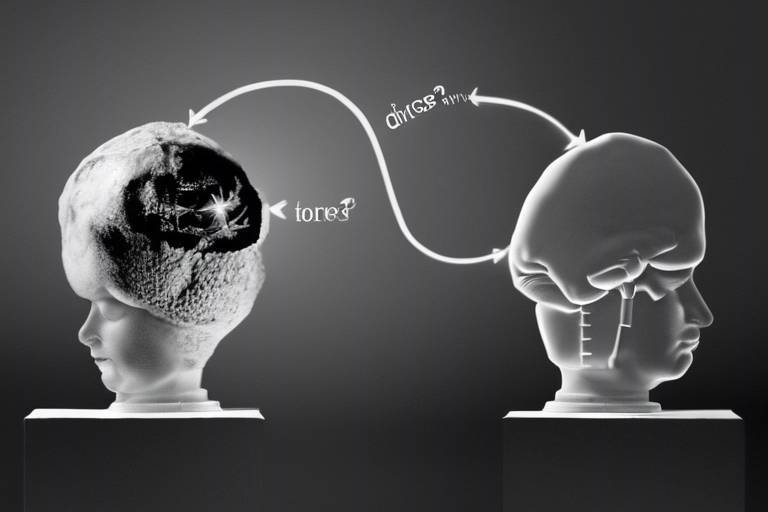The Role of Philosophy in Sports Science
In the world of sports science, one might not immediately think of philosophy as a key player. However, the truth is that philosophy serves as the backbone of many concepts that shape our understanding of athletics. From the ethical dilemmas faced by athletes to the very essence of competition, philosophical inquiries provide a lens through which we can examine the complexities of sports. Think about it: when an athlete steps onto the field, they are not just engaging in a physical contest; they are also navigating a landscape filled with moral choices, personal values, and societal expectations. Thus, the intersection of philosophy and sports science is not just fascinating; it is essential for a holistic understanding of athletic pursuits.
Consider the ethical dimensions of sports, where issues like fair play and doping come into sharp focus. These are not just rules; they are reflections of deeper philosophical questions about what it means to compete honorably. The dilemmas faced by athletes often echo larger societal values, making philosophy a crucial tool for understanding the implications of their actions. For example, when an athlete chooses to use performance-enhancing drugs, it raises questions about integrity, fairness, and the very definition of success in sports. This philosophical backdrop allows us to engage in meaningful discussions about the responsibilities of athletes and organizations alike.
Moreover, the philosophy of performance enhancement invites us to ponder the nature of competition itself. Are we truly competing against one another, or are we merely racing against our own limits? This inquiry leads to the distinction between natural talent and artificial enhancements, prompting us to question what constitutes authentic athleticism. In a world where technology is ever-evolving, the impact of advancements on sports challenges traditional notions of fairness and competition. For instance, does the use of sophisticated training equipment or data analytics undermine the spirit of the game? These questions are not just academic; they have real-world implications for athletes and fans alike.
As we delve deeper into the topic, we must also consider the various philosophical perspectives on success in sports. What does it really mean to be successful? Is it merely about winning trophies and accolades, or does it encompass personal growth and the pursuit of excellence? Different schools of thought provide contrasting views on this matter, emphasizing that success is not a one-size-fits-all concept. By exploring these diverse perspectives, we can enrich our understanding of what it means to strive for greatness in sports.
Furthermore, the relationship between philosophy and sports psychology cannot be overlooked. Mental resilience and motivation are crucial components of athletic performance, and the philosophical underpinnings of psychological strategies used by athletes can significantly influence their outcomes. Athletes often grapple with internal conflicts and external pressures, making it vital to understand the mental frameworks that guide their actions. By applying philosophical principles, athletes can cultivate a mindset that not only enhances performance but also fosters well-being.
In summary, the role of philosophy in sports science is both profound and multifaceted. It helps us navigate the ethical landscape of athletic competition, challenges our understanding of performance and success, and enriches the psychological dimensions of sports. As we continue to explore these themes, we gain valuable insights that can transform our approach to athletics, making the experience not just about physical prowess but also about ethical integrity and personal growth.
- What is the significance of philosophy in sports? Philosophy helps us understand the ethical, psychological, and performance-related aspects of sports, enriching our overall perspective.
- How does philosophy influence coaching? Philosophical frameworks can shape coaching styles, ethics, and the development of athletes, fostering a deeper understanding of the coach-athlete relationship.
- What are the ethical dilemmas faced by athletes? Issues like doping, fair play, and moral responsibilities are some of the ethical challenges athletes encounter.
- Can philosophy help in defining success in sports? Yes, different philosophical perspectives can provide insights into whether success is measured by winning or personal growth.

The Ethical Dimensions of Sports
The world of sports is not just a battleground for physical prowess; it is also a complex arena where ethical considerations play a crucial role. When we think about fair play, doping, and the moral responsibilities of athletes and organizations, we delve into a rich tapestry of philosophical inquiries that shape our understanding of sportsmanship. The ethical dimensions of sports challenge us to reflect on what it means to compete honorably and the values we uphold as participants and spectators.
At its core, sports are governed by a set of rules and norms designed to ensure fairness and integrity. However, these rules are often tested by the pressures of competition and the desire for victory. The question arises: what happens when the pursuit of excellence leads individuals or teams to compromise their ethical standards? The philosophical implications of such actions are profound, as they force us to confront the very essence of sportsmanship. Are athletes merely competitors, or are they also role models whose actions can influence society at large?
One of the most pressing ethical issues in sports today is doping. The use of performance-enhancing drugs raises significant moral questions. On one hand, athletes may argue that these substances allow them to reach their full potential, pushing the boundaries of human capability. On the other hand, doping undermines the spirit of competition and can have devastating health consequences. This dichotomy highlights a critical philosophical debate: does the end justify the means? In the realm of sports, this question becomes even more complex as we consider the impact of such decisions on the integrity of the sport itself.
Moreover, the responsibilities of organizations, coaches, and athletes extend beyond the playing field. They are tasked with fostering an environment that prioritizes ethical behavior. For instance, sporting organizations must ensure that their policies not only discourage doping but also promote education about the risks involved. This proactive approach can help instill a culture of integrity and respect within the sport. Here’s a brief overview of the ethical responsibilities of various stakeholders in sports:
| Stakeholder | Ethical Responsibility |
|---|---|
| Athletes | Compete fairly and serve as role models |
| Coaches | Promote ethical training practices and athlete well-being |
| Organizations | Implement fair policies and educate about ethics |
| Fans | Support fair play and respect all athletes |
Furthermore, the ethical dimensions of sports also encompass issues of inclusivity and diversity. As society evolves, so too does our understanding of what it means to be an athlete. Questions surrounding gender identity, race, and socioeconomic status challenge traditional views and require a philosophical reevaluation of how we define participation in sports. Are we creating an environment that is truly inclusive, or are we inadvertently perpetuating barriers that exclude certain groups? These inquiries compel us to reflect on the values we cherish in sports and how they align with broader societal principles.
Ultimately, the ethical dimensions of sports are not merely theoretical; they have real-world implications that affect the lives of athletes, coaches, and fans alike. By engaging with these philosophical questions, we can foster a culture that not only values competition but also emphasizes integrity, respect, and responsibility. As we navigate the complex landscape of sports, let us remember that the true essence of athleticism lies not just in victory but in the values we embody along the way.
- What are the main ethical issues in sports? Common issues include doping, fair play, and inclusivity.
- How do organizations promote ethical behavior? They implement fair policies, provide education, and foster a culture of integrity.
- Why is philosophy important in sports? Philosophy helps us understand the underlying principles of ethics, competition, and human experience in athletics.

The Philosophy of Performance Enhancement
The debate surrounding performance enhancement in sports is as complex as it is fascinating. At the heart of this discussion lies a fundamental question: what does it mean to be an athlete? Is it merely about physical prowess, or does it encompass a broader spectrum that includes mental and ethical dimensions? As we dive into this philosophical inquiry, we uncover layers of meaning that challenge our traditional views on competition and achievement.
Performance enhancement technologies, such as steroids, gene editing, and advanced training regimens, have sparked heated debates. On one hand, proponents argue that these enhancements allow athletes to push the boundaries of human capability, achieving feats that were once thought impossible. On the other hand, critics raise concerns about the integrity of sports and the essence of competition itself. Are we still witnessing true athleticism if an athlete's success hinges on artificial means? This question is not just about sports; it's a reflection of society's values and the lengths to which individuals are willing to go to achieve greatness.
To better understand this philosophical dilemma, we can categorize performance enhancements into two main types: natural and artificial. Natural enhancements might include rigorous training, proper nutrition, and mental conditioning, while artificial enhancements encompass the use of drugs, technology, and genetic modifications. The distinction between these two categories raises questions about authenticity and fairness in sports.
When we consider the concept of authentic athleticism, it's essential to reflect on how philosophy can help us define what it means to be a true competitor. For instance, one might argue that natural talent and hard work represent the purest form of athletic achievement. In contrast, others might contend that using technology and enhancements is simply an evolution of the sport, akin to how athletes in the past relied on specialized training techniques.
To illustrate this philosophical debate, let's look at a table comparing natural and artificial enhancements:
| Type | Definition | Implications |
|---|---|---|
| Natural Enhancement | Improving performance through training, nutrition, and mental strategies. | Promotes integrity and authenticity in sports. |
| Artificial Enhancement | Using drugs or technology to boost performance. | Raises ethical concerns about fairness and the spirit of competition. |
As we navigate these philosophical waters, we must also consider the impact of technology on sports. Advancements in technology—like wearable fitness trackers and data analytics—have transformed how athletes train and compete. While these tools can enhance performance, they also blur the line between natural ability and technological assistance. This evolution challenges our understanding of what it means to compete fairly and raises significant questions about the future of sports.
Another critical aspect of the philosophy of performance enhancement is how we define success. Is it merely about winning? Or does it encompass personal growth, resilience, and the pursuit of excellence? Different philosophical perspectives offer varying insights into this question. For some, victory is the ultimate goal, while for others, the journey and the lessons learned along the way hold equal or greater value. This divergence in thought highlights the multifaceted nature of success in sports.
Ultimately, the philosophy of performance enhancement invites us to reflect on our values and beliefs about sports and competition. It challenges us to consider not only what we achieve but how we achieve it. As athletes, coaches, and fans, we must engage in this dialogue to foster a deeper understanding of the implications of performance enhancement on the integrity of sports.
- What is performance enhancement? Performance enhancement refers to methods used to improve athletic performance, which can be natural (training, nutrition) or artificial (drugs, technology).
- Is performance enhancement ethical? The ethics of performance enhancement is debated; some believe it undermines the spirit of competition, while others see it as an evolution of sport.
- How does technology impact sports? Technology changes how athletes train and compete, raising questions about fairness and the definition of true athleticism.
- What does success mean in sports? Success can be defined in various ways, including winning, personal growth, and the pursuit of excellence.

Natural vs. Artificial Enhancement
In the fascinating world of sports, the debate between natural and artificial enhancement often stirs up passionate discussions. On one hand, we have athletes who rely on their innate abilities, honed through years of hard work and dedication. On the other, we see those who turn to technology and substances to gain an edge. But what does it really mean to be an athlete? Is the essence of competition rooted in pure talent, or has it evolved to include the benefits of modern science? This is where philosophy steps in, helping us navigate the murky waters of authenticity and integrity.
When we talk about natural enhancement, we refer to the development of skills, strength, and endurance through traditional training methods. This includes rigorous practice, coaching, and a healthy lifestyle. Athletes who embrace natural enhancement often feel a sense of pride in their achievements, believing that their success is a reflection of their hard work and discipline. They embody the spirit of fair play and competition, where the thrill of victory is earned, not given.
Conversely, artificial enhancement encompasses a range of practices, from performance-enhancing drugs to advanced technology such as biomechanical aids. These methods can significantly alter an athlete's performance, leading to questions about fairness and the true nature of competition. For instance, when an athlete uses steroids or other substances to boost their physical capabilities, can we still consider their achievements genuine? Philosophically, this raises profound questions about what constitutes authentic athleticism.
To better understand these distinctions, let's explore the implications of each approach:
| Aspect | Natural Enhancement | Artificial Enhancement |
|---|---|---|
| Definition | Development through training and natural talent | Use of technology or substances to improve performance |
| Ethics | Generally accepted in sports | Often viewed as unethical or against the spirit of sport |
| Perception of Achievement | Earned through hard work | Questionable authenticity of achievement |
This table illustrates the stark contrast between the two approaches. While natural enhancement is celebrated and respected, artificial enhancement often faces skepticism and condemnation. The philosophical implications are profound: if we accept artificial enhancement as a valid means of competition, do we risk diluting the very essence of sports? Are we saying that the ends justify the means, or does the journey matter just as much as the destination?
Moreover, the philosophical inquiry extends beyond just the athletes to include coaches, organizations, and fans. How do we, as a society, define the boundaries of fair play? Is it enough to simply have rules, or do we need a deeper understanding of the ethical responsibilities involved in sports? These questions challenge us to think critically about our values and the future of athletic competition.
Ultimately, the discussion around natural versus artificial enhancement is not just about sports; it's a reflection of our broader societal values. As we continue to innovate and push the boundaries of human potential, we must also consider what it means to be truly great. Are we willing to embrace a definition of success that includes both natural talent and technological advances, or do we hold steadfast to the ideals of authenticity and integrity? The answers may not be clear-cut, but engaging in this philosophical dialogue is essential for the evolution of sports and our understanding of human achievement.
- What is the main difference between natural and artificial enhancement?
Natural enhancement is achieved through training and talent, while artificial enhancement involves the use of substances or technology. - Why is artificial enhancement often viewed negatively?
It raises ethical concerns regarding fairness and authenticity in sports. - Can philosophy help us navigate the debate on enhancement?
Yes, philosophy encourages critical thinking about ethics and the true nature of competition.

The Impact of Technology on Sports
In the ever-evolving landscape of sports, technology has emerged as a game-changer, redefining the way athletes train, compete, and engage with their audiences. Think about it: just a few decades ago, athletes relied on their physical prowess and traditional training methods to excel. Fast forward to today, and we see a world where cutting-edge technology is integrated into every facet of sports. From wearable devices that monitor performance metrics to advanced analytics that inform coaching decisions, technology is not just a tool; it’s a transformative force.
One of the most significant impacts of technology on sports is its ability to enhance performance analysis. Coaches and athletes now have access to a wealth of data that can help them understand strengths and weaknesses on a granular level. For instance, video analysis software allows for the breakdown of an athlete's technique, enabling targeted improvements. This level of insight was unimaginable in the past, and it raises questions about the essence of training: are athletes now more reliant on data than on instinct?
Moreover, technology has revolutionized the way we view and understand competition. With innovations like virtual reality (VR), athletes can simulate game scenarios, allowing them to practice decision-making in a controlled environment. This not only enhances their skills but also prepares them mentally for high-pressure situations. Imagine a quarterback practicing against a virtual defense; the possibilities are endless. However, this reliance on technology also prompts philosophical inquiries about the authenticity of competition. Are we still witnessing the same raw talent, or has technology diluted the essence of athleticism?
Another area where technology has made a significant impact is in fan engagement. Social media platforms, mobile applications, and live-streaming services have transformed the spectator experience, making it more interactive and immersive. Fans can now engage with their favorite teams and athletes in real-time, which fosters a sense of community. However, this brings about ethical considerations regarding data privacy and the commercialization of sports. Are we sacrificing the integrity of the sport for the sake of entertainment and profit?
As we delve deeper into the implications of technology in sports, we must also consider its impact on fairness. Advanced training equipment and performance-enhancing technologies can create disparities among athletes. For example, access to sophisticated training facilities and resources can give certain athletes a competitive edge, raising questions about equity in sports. Is it fair for some athletes to have access to superior technology while others do not? This dilemma challenges the foundational principles of sportsmanship and fair play.
In summary, the impact of technology on sports is profound and multifaceted. It has reshaped how athletes train, how coaches strategize, and how fans engage with the sport. However, as we embrace these advancements, we must also reflect on the philosophical questions they raise. Are we enhancing the human experience in sports, or are we losing something essential in the process? As we continue to navigate this technological terrain, it is crucial to strike a balance between innovation and the core values that define athletic competition.
- How has technology changed athlete training methods?
Technology has introduced advanced performance analysis tools, wearable devices, and virtual training environments, allowing athletes to optimize their training regimens and improve their skills more effectively. - What ethical concerns arise from technology in sports?
Issues such as data privacy, fairness in access to training resources, and the potential commercialization of sports can challenge the integrity and ethical foundations of athletic competition. - Can technology diminish the authenticity of competition?
Yes, as athletes increasingly rely on technology for training and performance enhancement, it raises questions about the authenticity of their skills and the essence of competition itself.

Defining Success in Sports
When we think about success in sports, what comes to mind? Is it the shiny trophies, the roaring crowds, or the records shattered? Or is it something deeper, a journey of personal growth and resilience? The definition of success in the realm of athletics is not as straightforward as it may appear. It often intertwines with various philosophical perspectives that challenge our conventional notions of winning and achievement. For some, success is measured by the number of victories or medals, while for others, it lies in the lessons learned and the character built through the experience of competition.
Philosophically speaking, we can categorize success in sports into several dimensions:
- Winning: This traditional view equates success with tangible outcomes—trophies, titles, and records. It's the glory of standing atop the podium that many athletes strive for.
- Personal Growth: Here, success is about the journey. Athletes may define their achievements by the progress they make, the skills they develop, and the challenges they overcome.
- Team Contribution: For team sports, success can be about how well an athlete contributes to the collective effort. It’s not just about individual accolades but fostering teamwork and camaraderie.
- Excellence: This perspective focuses on striving for one’s personal best. It’s about setting high standards and pushing oneself to reach new heights, regardless of the competitive outcome.
These dimensions reflect the complexity of success in sports. Athletes often grapple with these varying definitions, especially when they face setbacks or failures. Imagine a runner who trains tirelessly but finishes just shy of the podium. While traditional metrics might deem their effort a failure, the lessons learned, the friendships forged, and the personal milestones achieved can be equally rewarding. This nuanced understanding of success can lead to a more fulfilling athletic experience, where the journey is just as valuable as the destination.
Moreover, the philosophical discourse surrounding success in sports also raises questions about societal values. In a world that often glorifies winning at all costs, how do we reconcile this with the importance of sportsmanship and ethical behavior? This tension prompts a deeper inquiry into what we truly value as a society. Are we willing to celebrate athletes who embody integrity and perseverance, even if they don’t always finish first?
In conclusion, defining success in sports is a multi-faceted endeavor that goes beyond the scoreboard. It invites us to reflect on our values, the essence of competition, and the human experience in athletic pursuits. By embracing a broader understanding of success, we can cultivate a more inclusive and enriching sports culture that honors both the triumphs and trials of athletes.
- What is the most common definition of success in sports? While many equate success with winning, it's increasingly recognized that personal growth and contributions to a team are equally important.
- How can athletes redefine success for themselves? Athletes can focus on their personal goals, improvements, and the enjoyment of the sport rather than solely on winning.
- Why is it important to have a broader definition of success in sports? A broader definition helps foster resilience, sportsmanship, and a love for the game, allowing athletes to find fulfillment beyond just trophies.

Philosophy and Sports Psychology
When we think about sports, the first images that often come to mind are of athletes sprinting down a track, scoring goals, or lifting weights. But what lies beneath these physical feats? The answer is a complex interplay of mental resilience and psychological strategies that athletes employ to push their limits. This is where the fascinating intersection of philosophy and sports psychology comes into play. Philosophy offers a framework for understanding the mental processes that drive athletes, helping them navigate the pressures of competition and the intricacies of their own minds.
At its core, sports psychology is about enhancing performance through mental techniques and strategies. However, the philosophical underpinnings of these practices can provide deeper insights into why they work. For instance, consider the concept of mindfulness. This philosophical approach encourages athletes to focus on the present moment, reducing anxiety and enhancing concentration. By embracing mindfulness, athletes can cultivate a state of flow, where they are fully immersed in their performance, leading to optimal results. This connection between philosophy and psychology raises intriguing questions: What does it mean to be present? How can an athlete's mindset influence their performance?
Moreover, the exploration of motivation in sports psychology can be enriched by philosophical inquiry. Different philosophical schools, such as existentialism and stoicism, offer varying perspectives on what drives individuals to pursue greatness. Existentialists might argue that athletes find meaning through their struggles and triumphs, while stoics would emphasize the importance of self-control and resilience in the face of adversity. By examining these philosophical perspectives, athletes can gain a more profound understanding of their motivations and, ultimately, enhance their performance.
Additionally, the concept of mental resilience is crucial in sports psychology, and philosophy can help illuminate its significance. Resilience is not merely about bouncing back from failure; it’s about embracing challenges as opportunities for growth. Philosophers like Friedrich Nietzsche, who famously declared, "What does not kill me makes me stronger," provide a powerful lens through which athletes can view setbacks. This perspective encourages athletes to adopt a growth mindset, viewing obstacles as integral to their development rather than as insurmountable barriers.
To further illustrate the impact of philosophy on sports psychology, let’s consider the role of self-talk. Athletes often engage in internal dialogues that can either uplift or undermine their confidence. Philosophical inquiry into the nature of self-awareness and self-perception can shed light on how athletes can harness positive self-talk to enhance their performance. By understanding the philosophical implications of their thoughts, athletes can cultivate a more empowering narrative, transforming doubt into determination.
In summary, the relationship between philosophy and sports psychology is rich and multifaceted. Philosophical principles not only inform the mental strategies athletes use but also provide a deeper understanding of the human experience within sports. By exploring these connections, athletes can unlock new dimensions of their performance, pushing the boundaries of what is possible in their athletic endeavors.
- How does philosophy influence sports psychology?
Philosophy provides a framework for understanding mental processes, motivations, and resilience strategies that athletes use to enhance their performance. - What is the role of mindfulness in sports?
Mindfulness helps athletes focus on the present moment, reducing anxiety and improving concentration, ultimately leading to better performance. - Can philosophy help with an athlete's motivation?
Yes, different philosophical perspectives can offer insights into what drives athletes, helping them find deeper meaning and purpose in their pursuits. - What is mental resilience in sports?
Mental resilience is the ability to bounce back from setbacks and challenges, viewing them as opportunities for growth rather than obstacles.

The Role of Philosophy in Coaching
Coaching is more than just teaching skills and strategies; it's an intricate dance of mentorship and guidance that shapes athletes into their best selves. The heart of coaching lies in its philosophical underpinnings, which help define the values and ethics that coaches embody. By embracing philosophical frameworks, coaches can create environments that foster not only athletic prowess but also personal growth and resilience. So, what does it mean to coach with a philosophical lens? Let's dive into this fascinating intersection of thought and practice.
At its core, coaching is about relationships. A coach's philosophy influences how they interact with athletes, set goals, and respond to challenges. For instance, a coach who subscribes to a humanistic philosophy may prioritize the emotional and psychological well-being of their athletes, focusing on personal development alongside performance. This approach encourages athletes to view challenges as opportunities for growth rather than mere obstacles. On the other hand, a coach influenced by a more utilitarian perspective might prioritize winning above all else, potentially leading to a more cutthroat environment. The philosophical stance adopted by a coach can significantly affect team dynamics and individual athlete experiences.
Moreover, the ethics of coaching cannot be overlooked. Coaches face various dilemmas that require a firm grounding in ethical principles. For example, should a coach push an athlete to their limits, or should they prioritize their health and well-being? This is where philosophy serves as a guiding light. By applying ethical theories such as deontology (duty-based ethics) or virtue ethics (focusing on character), coaches can navigate these complex situations with a clearer moral compass. They can ask themselves questions like, "What is my duty to this athlete?" or "What kind of character do I want to foster in my team?" These reflections lead to more thoughtful decision-making that prioritizes athlete welfare.
In addition to ethics, philosophy also informs coaching styles. Different philosophical approaches can lead to distinct coaching methodologies. For instance, a coach influenced by constructivist philosophy might emphasize experiential learning, where athletes learn through doing and reflecting on their experiences. This approach not only enhances skill acquisition but also empowers athletes to take ownership of their development. Conversely, a coach who follows a more traditional, behaviorist approach may focus on drills and repetition, aiming for mastery through structured practice. Understanding these philosophical foundations allows coaches to tailor their methods to suit the needs of their athletes, creating a more effective and engaging training environment.
Ultimately, the role of philosophy in coaching extends beyond the confines of the training ground. It influences how coaches perceive success, define their goals, and relate to the broader sports community. Coaches who engage with philosophical concepts are often more reflective and intentional in their practices, leading to a richer coaching experience for both themselves and their athletes. As they grapple with questions about fairness, competition, and the essence of athletic achievement, they cultivate a deeper understanding of what it means to be a coach in today's fast-paced sports world.
- How can philosophy improve coaching effectiveness? Philosophy encourages coaches to reflect on their values, ethics, and methodologies, leading to more intentional and impactful coaching practices.
- What ethical dilemmas do coaches commonly face? Coaches often encounter dilemmas related to athlete health, performance pressure, and the balance between winning and development.
- Can a coach's philosophy change over time? Absolutely! Coaches may evolve their philosophies based on experiences, new insights, and changes in the sporting landscape.
- How does a coach's philosophy affect athlete development? A well-defined coaching philosophy can create a supportive environment that fosters personal growth, resilience, and a love for the sport.

Coaching Ethics
When we dive into the world of coaching, it's impossible to ignore the profound impact of ethics on the development of athletes. Coaches are not just instructors; they are mentors, role models, and sometimes even parental figures. The ethical responsibilities they carry can shape not only the performance of their athletes but also their overall character. Imagine a coach who prioritizes winning at all costs. What kind of message does that send to young athletes? This is where the philosophical underpinnings of coaching ethics come into play, guiding coaches to make decisions that foster integrity, respect, and fairness.
At its core, coaching ethics revolves around the principles of honesty, integrity, and fairness. These principles are not just abstract ideas; they manifest in everyday decisions that coaches make. For instance, consider the issue of favoritism. A coach who shows bias towards certain players undermines the entire team dynamic and sows discord among athletes. This is not just a practical issue; it's an ethical one. Coaches must strive to treat all athletes equitably, ensuring that everyone has an equal opportunity to shine. This is where philosophical inquiry can help coaches reflect on their practices and make more informed, ethical decisions.
Moreover, the ethical responsibilities of coaches extend beyond the field. They have a duty to promote a positive environment that encourages mental health and well-being. This means being attentive to the emotional and psychological needs of athletes. Coaches should foster resilience, encouraging athletes to push through challenges while also recognizing when to step back and provide support. The balance between pushing for excellence and ensuring mental health is delicate, but it is crucial for the holistic development of athletes.
Additionally, the ethics of coaching can often be tested in high-pressure situations, such as during competitions or when dealing with performance issues. Coaches may face dilemmas where the line between motivation and manipulation blurs. For example, is it ethical to pressure an athlete to perform despite their physical limitations? This is where philosophical discussions about the nature of motivation and coercion become essential. Coaches must navigate these waters carefully, ensuring that their methods align with ethical standards that prioritize the athlete's health and well-being.
To further illustrate the importance of coaching ethics, let's look at some key ethical principles that can guide coaches:
- Respect for the Athlete: Treating each athlete with dignity and recognizing their individuality.
- Commitment to Fairness: Ensuring that all athletes have equal opportunities and are judged based on their performance, not personal biases.
- Integrity in Communication: Being honest and transparent in all interactions, fostering trust between coach and athlete.
- Focus on Development: Prioritizing the long-term growth of athletes over short-term victories.
In conclusion, coaching ethics is not merely a checklist to tick off; it is a living, breathing aspect of the coaching profession that demands continuous reflection and adaptation. Coaches must engage with philosophical principles to navigate the complexities of their role, ensuring that they contribute positively to the lives of their athletes. The impact of ethical coaching extends far beyond the sports arena, shaping the future of individuals and the culture of sports as a whole.
- What are the main ethical responsibilities of a coach? Coaches should prioritize fairness, respect, integrity, and the overall well-being of their athletes.
- How can coaches ensure they are acting ethically? By engaging in self-reflection, seeking feedback, and adhering to established ethical guidelines within their sport.
- What role does philosophy play in coaching ethics? Philosophy provides a framework for understanding ethical dilemmas and helps coaches make informed decisions that align with their values.

Philosophical Approaches to Training
When it comes to training in sports, one might not immediately think of philosophy as a guiding force, but the truth is that philosophical approaches play a crucial role in shaping how athletes prepare for competition. Just as a sculptor sees the potential in a block of marble, a coach or athlete must understand the underlying principles of training to unlock their fullest potential. The essence of training is not merely physical; it’s a complex interplay of mental, emotional, and ethical dimensions that can significantly influence performance.
At the heart of these philosophical approaches are questions that challenge our understanding of what it means to train effectively. For instance, should training focus solely on physical prowess, or should it also cultivate mental resilience? This inquiry leads us to explore various schools of thought. Some philosophies advocate for a holistic approach, emphasizing the balance between body and mind, while others may prioritize specific techniques or methodologies that promise quick results. In this context, it’s essential to recognize how these differing philosophies can impact an athlete’s journey.
One popular philosophical approach is the concept of existentialism in training. Existentialists believe in the importance of personal experience and individual choice. For athletes, this could translate into a training regimen that is tailored to their unique strengths and weaknesses, allowing them to take ownership of their development. This approach encourages athletes to ask themselves questions like, “What does success look like for me?” and “How can I best prepare myself for the challenges ahead?” By fostering a sense of autonomy, existentialism can lead to greater motivation and commitment.
On the other hand, we have the utilitarian perspective, which focuses on the greatest good for the greatest number. In a training context, this could mean developing programs that not only enhance individual performance but also benefit the entire team or community. Coaches adopting this philosophy might prioritize strategies that promote teamwork and collective success, fostering an environment where athletes support one another in their training endeavors. This approach can cultivate a strong sense of camaraderie, ultimately enhancing both individual and team performance.
Additionally, stoicism offers valuable insights into training philosophies. Stoics emphasize the importance of self-control, perseverance, and resilience in the face of adversity. Athletes who embrace this philosophy may view challenges as opportunities for growth rather than obstacles. They learn to accept what they cannot control, such as the outcome of a competition, while focusing on their own efforts and preparation. This mindset can lead to improved performance, as athletes become less susceptible to the pressures and distractions that often accompany competitive sports.
Incorporating these philosophical approaches into training can also lead to a more profound understanding of the coach-athlete relationship. Coaches who embrace a philosophical framework are more likely to foster an environment that encourages open communication, trust, and mutual respect. This can create a supportive atmosphere where athletes feel empowered to express their thoughts and feelings, ultimately enhancing their training experience.
As we delve deeper into the philosophical dimensions of training, it’s also essential to recognize the role of technology in shaping modern training methods. With advancements in data analytics and wearable technology, athletes can now access real-time feedback on their performance. This intersection of philosophy and technology raises questions about the nature of training itself. Are we enhancing our capabilities or merely relying on gadgets to do the work for us? This philosophical inquiry can lead to a more thoughtful approach to integrating technology into training, ensuring that it complements rather than replaces the fundamental principles of athletic preparation.
In conclusion, philosophical approaches to training are not just abstract concepts; they are practical frameworks that can significantly influence how athletes prepare for their sport. By examining the ethical, existential, and utilitarian dimensions of training, athletes and coaches can cultivate a more holistic understanding of what it means to train effectively. Ultimately, the goal is to create a training environment that promotes not only physical excellence but also personal growth, resilience, and a deep appreciation for the journey of athleticism.
- What is the importance of philosophy in sports training? Philosophy provides a framework for understanding the deeper implications of training, including ethics, personal growth, and the mental aspects of performance.
- How can different philosophical approaches impact an athlete's training? Different philosophies can shape training methodologies, influence motivation, and affect the coach-athlete relationship, ultimately impacting performance.
- Can technology enhance philosophical approaches to training? Yes, technology can provide valuable insights and data, but it should complement philosophical principles rather than replace them.
Frequently Asked Questions
- How does philosophy influence ethics in sports?
Philosophy plays a crucial role in shaping the ethical landscape of sports. It helps us navigate complex issues such as fair play, doping, and the responsibilities of athletes and organizations. By applying philosophical principles, we can better understand what constitutes ethical behavior in competitive environments, guiding athletes and coaches in their decision-making processes.
- What are the philosophical debates surrounding performance enhancement?
The debates surrounding performance enhancement technologies and methods raise fundamental questions about the nature of competition and what it means to achieve success in sports. Philosophers challenge us to consider whether enhancements undermine the spirit of athleticism or if they are simply tools that level the playing field. This ongoing discourse helps us define the essence of athletic achievement in contemporary society.
- How can philosophy help define authentic athleticism?
Philosophy aids in distinguishing between natural talent and artificial enhancements. By examining concepts of authenticity and integrity, it encourages us to reflect on what makes an athlete truly exceptional. This exploration can lead to a deeper appreciation for the nuances of competition and the values we hold dear in sports.
- What impact does technology have on traditional views of athletic performance?
Advancements in technology challenge our conventional understanding of what it means to perform well in sports. They prompt us to reconsider notions of fairness and competition. Philosophical inquiry into these changes helps us grapple with the implications of technology, ensuring that we maintain the integrity of sports while embracing innovation.
- How is success defined in sports from a philosophical perspective?
Philosophical perspectives on success in sports vary widely. Some argue that winning is the ultimate goal, while others emphasize personal growth and the pursuit of excellence. By exploring these differing viewpoints, we can cultivate a more holistic understanding of what it means to be successful in athletic endeavors.
- What is the connection between philosophy and sports psychology?
The intersection of philosophy and sports psychology is rich with insights into mental resilience and motivation. Philosophical frameworks can inform psychological strategies, helping athletes develop a stronger mindset. This connection enhances our understanding of the mental aspects of performance and how they relate to overall athletic success.
- How can philosophical frameworks shape coaching practices?
Philosophical frameworks provide a foundation for effective coaching practices. They influence coaching styles, ethical considerations, and the development of athletes. By understanding these frameworks, coaches can foster more meaningful relationships with their athletes, promoting both personal and athletic growth.
- What ethical responsibilities do coaches have?
Coaches hold significant ethical responsibilities that can greatly impact athlete development and well-being. Philosophical principles guide their actions and decisions, ensuring that they prioritize the holistic development of their athletes while maintaining integrity and fairness in their coaching practices.
- How do different philosophical approaches influence training methodologies?
Various philosophical approaches can significantly shape training methodologies in sports. By exploring different schools of thought, coaches and athletes can adopt diverse training philosophies that align with their values and goals. This exploration enhances the overall philosophy of sports preparation, leading to more effective and meaningful training experiences.



















